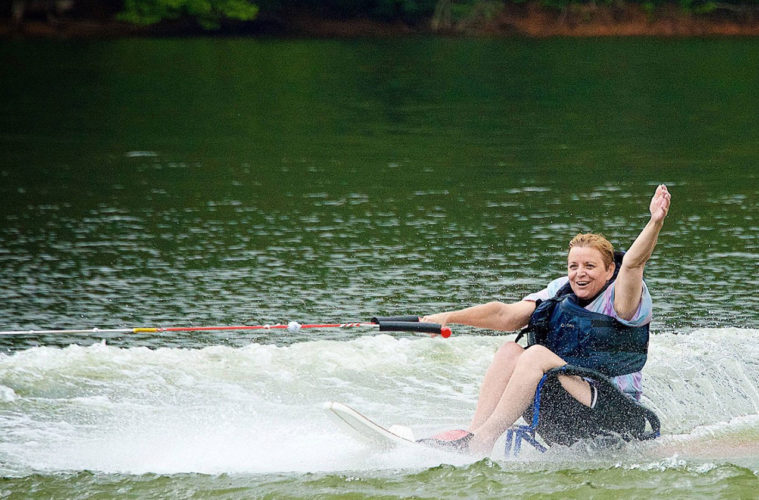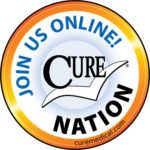 Kim Harrison from Douglasville, Georgia, is a friendly face in the advocacy world for Transverse Myelitis and other mobility conditions. We’re sharing her story to encourage you to join us at the upcoming Roll on Capitol Hill hosted by United Spinal in June.
Kim Harrison from Douglasville, Georgia, is a friendly face in the advocacy world for Transverse Myelitis and other mobility conditions. We’re sharing her story to encourage you to join us at the upcoming Roll on Capitol Hill hosted by United Spinal in June.
While there, Kim will be rolling alongside 100+ people who are all striving to help our community gain appropriate medical coverage for healthcare along with a myriad of other accessibility issues. Below, Kim shares her outlook on life with Transverse Myelitis, a little-known and often misunderstood condition.
Kim says, “I’m a regular reader of the CURE NATION. The articles on this blog are very helpful and very useful! I appreciate that they also include information for caregivers too, because people who ride wheelchairs are not the only people impacted by disabilities.”
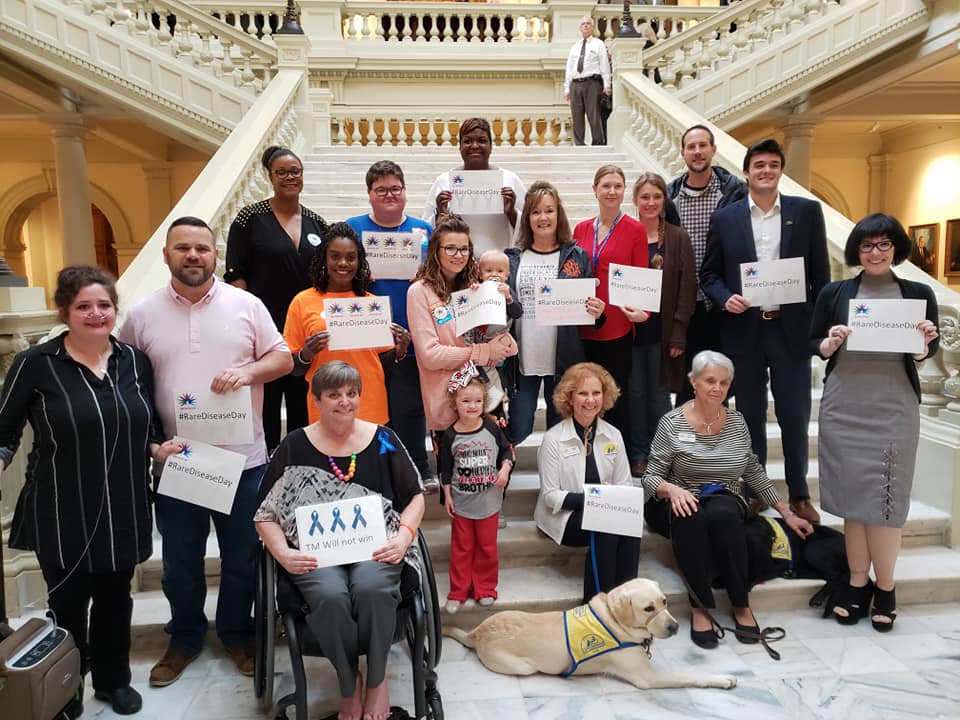
You’ll often find Kim speaking up for disability rights and assistance in her local community throughout Georgia as well as on Capitol Hill.
KIM WAKES UP TO TRANSVERSE MYELITIS
“We know what you have. It’s Transverse Myelitis,” the doctor said right before walking out of Kim’s room, leaving her all alone to wonder what the heck had just happened.
Four days earlier, Kim Harrison woke up and noticed her foot was numb and tingly. ‘No big deal,’ she thought, ‘I must’ve pinched a nerve or something at work yesterday.’
When the feeling began creeping up her leg, she reluctantly agreed to get checked out. At the urgent care they thought Kim was having a stroke since she was showing symptoms of paralysis on her right side. By noon, she was numb from the waist down. Still, Kim didn’t believe it was that serious.
“The next morning, my left leg started doing the same thing,” Kim recounts. “Until then I was joking about having to even go the ER for a pinched nerve. I couldn’t believe they admitted me for the night. They had no idea what was going on, then on Sunday I got the diagnosis. The doctor left and I didn’t know what Transverse Myelitis was. My sister-in-law had to google it.”
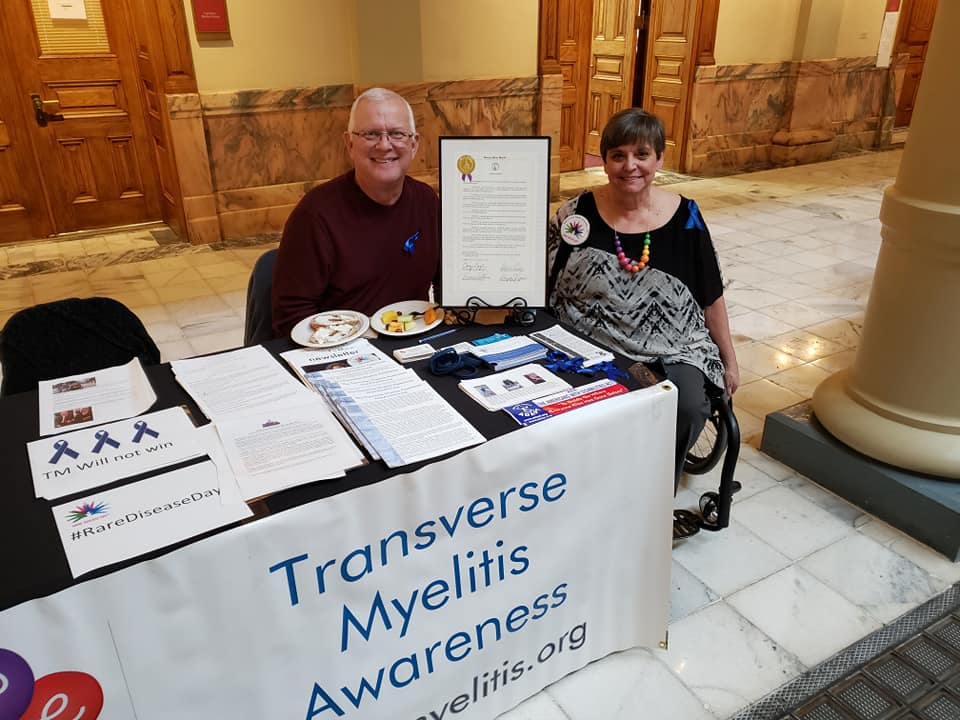
Today, Kim educates people on the nuances of Transverse Myelitis to help others who are on the same journey with the condition.
That was 15 years ago. Kim had been working at a warehouse west of Dallas, TX, for less than a month when her entire life changed one morning.
“When we looked it up, it sounded like my life was over. It tells you all the things you can’t do anymore, not what you can,” Kim says. “The Transverse Myelitis Association was a lot better resource that we found, and now I’m the Georgia support group leader and hope ambassador for their organization.”
“Sometimes when I explain to people what Transverse Myelitis is, I say it’s like a spinal cord stroke. It’s when your immune system goes haywire and attacks the spinal cord. For me, it all happened so fast I didn’t believe it’d be permanent.”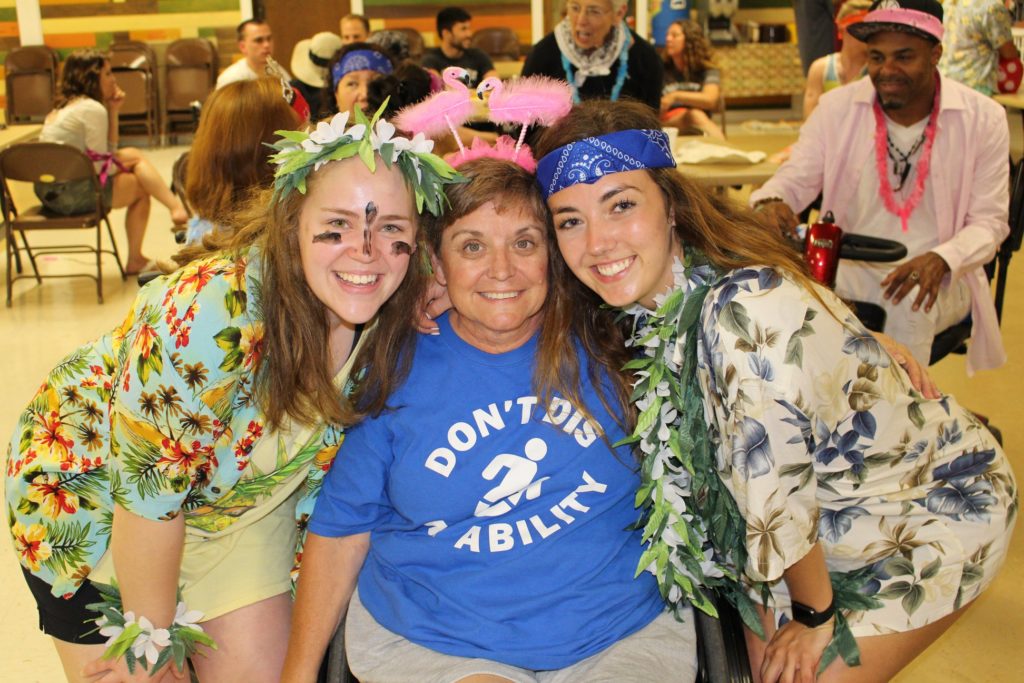
ONE FALSE WORD CAUSED KIM TO BE DENIED REHAB
Kim was sent to a nearby hospital for further assistance. Unfortunately, “they didn’t know anything about spinal cord injury there,” Kim says. “My nurses were googling TM just like we had done to find out what it was. They pretty much didn’t know what to do with me. I made arrangements to go to Shepherd Center in Atlanta but never got there.”
For some unknown reason, one of her therapists wrote in Kim’s medical chart that she could put on a sock by herself so her insurance plan assumed she was independent and sent her back home to Georgia, refusing to pay for additional rehabilitation.
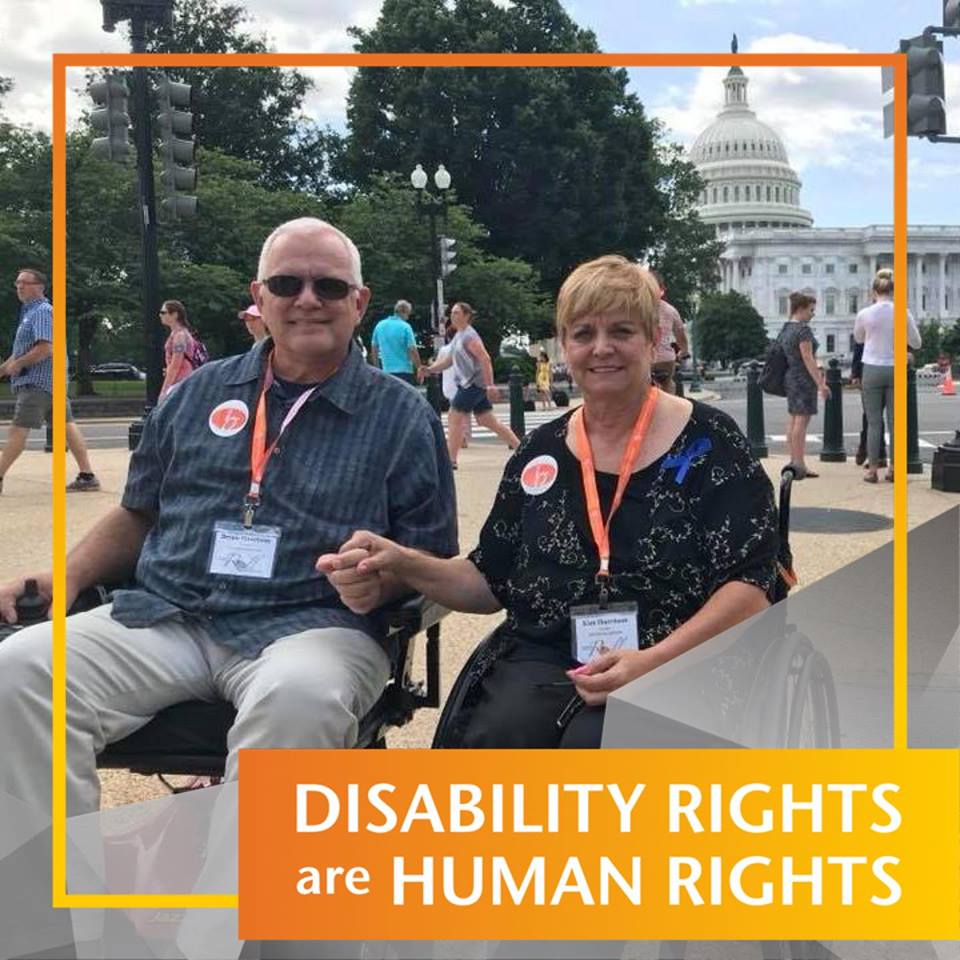
Kim Harrison and her husband Brian work tirelessly for disability rights to help others avoid the same circumstances she faced after being diagnosed with TM.
THE SHOCKING TRUTH ABOUT KIM’S SELF-EDUCATION AFTER SCI
Kim learned to transfer to a car for the first time in the hospital parking lot after she was discharged (without a sliding board), and learned how to go to the bathroom in a wheelchair while she was sitting in the airport before her flight home. No one taught her those skills in the Texas hospital.
Kim and her husband Brian were forced to learn everything about living with a spinal cord injury on their own.
Fortunately, they had friends who built a ramp so she could get in the house and they also bought her a tub bench. “We both had to kinda adjust on the fly,” Kim admits, “but we helped each other. We have a great relationship. Laughter and sarcasm have carried us through.”
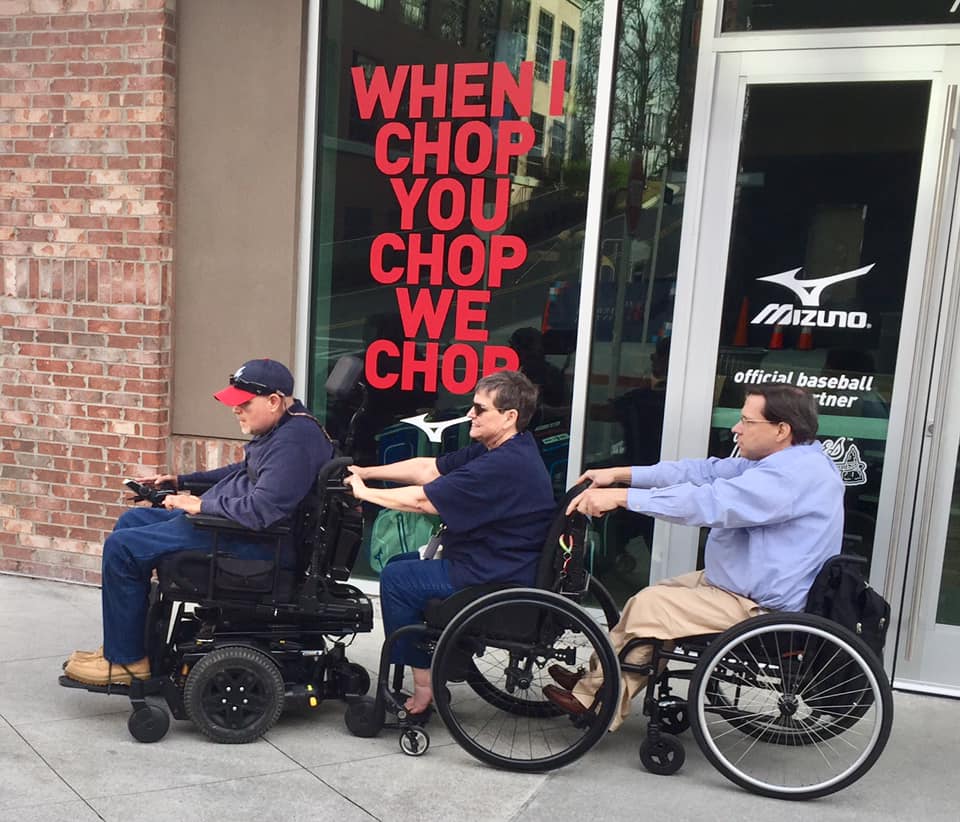
For many, Transverse Myelitis feels like the flu before paralysis sets in.
“TM is like SCI in that there’s a very low chance of recovery,” Kim explains. “It’s classified as non-traumatic spinal cord injury. I realized pretty fast once I got diagnosed that I probably wasn’t going to walk again.”
Kim attributes her self-education to sheer necessity for moving forward without help. “I didn’t have much time to mourn,” she explains. “I was discharged in less than two weeks after my diagnosis so I focused on what I was going to need to live. Within a month, I was back at work.”
DRIVING WAS A WHOLE NEW CHALLENGE for Kim
Driving wasn’t easy for Kim when she arrived in Douglasville, GA, a small town 20 miles west of Atlanta, but she’d need to in order to go back to work.
“Sitting at home wasn’t going to work for me. I had a beautiful red convertible mustang but it was a stick shift,” Kim laments, “We had to buy a Honda Element and get it set up with a left-foot accelerator because I could use my left leg enough to drive. That opened up a whole new world for me.”
Going back to work was a big deal for Kim too. After figuring out how to drive, she applied for a position at a Lowe’s Distribution Center, beating out 300 people for the job.
Kim didn’t let the physical barriers of the job site stop her from applying and the people at Lowe’s didn’t let her disability keep them from offering her the job. They were surprisingly open to custom-fitting the workplace to someone in a wheelchair, and Kim has since become their ADA expert.
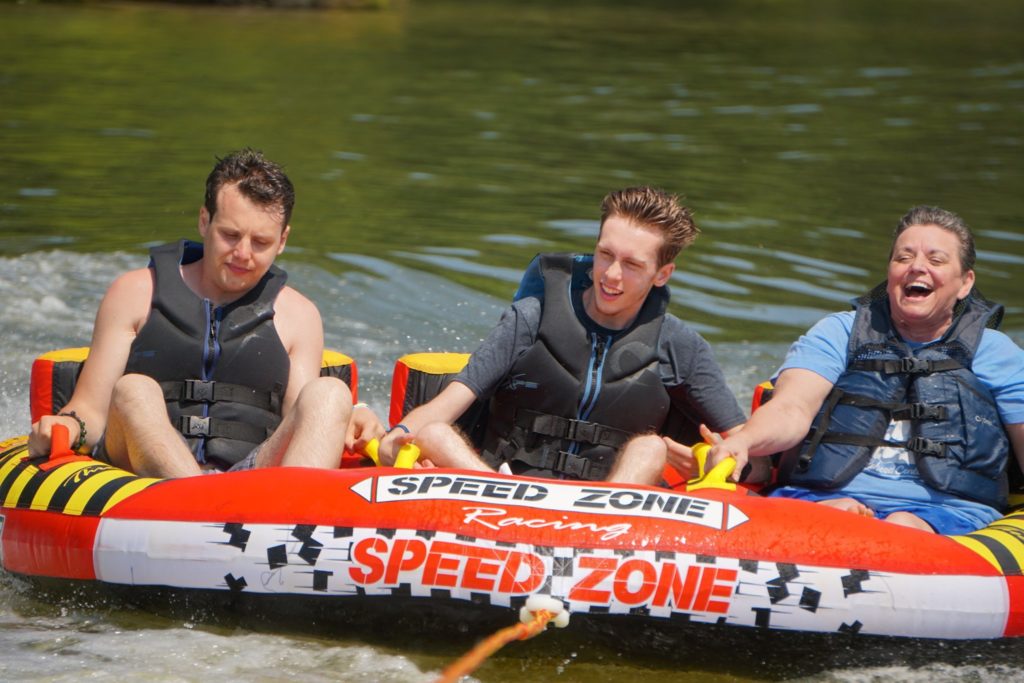
Kim loves discovering new adaptive adventures!
KIM ENCOURAGES OTHERS WITH HER ATTITUDE, ADVENTURE & ACTIVISM
“The first time I pulled into the parking lot at Shepherd Center in Atlanta, I felt like I was home,” Kim says. “I went there to find a new neurologist but found their recreation center instead. While I was in the waiting room, I picked up a brochure and read about their Adventure Skills Workshop. I wanted to try everything!”
Whenever Kim sees something new, she does it. She was like a kid learning how to play the first time she attended the workshop. Kim did everything from handcycling to zip lining to water skiing to tennis.
“I love to swim now because it’s so freeing. In the water I can move around with so little effort. That’s my favorite thing to do now. Second would be handcycling,” she boasts. “I do it all. I like archery too, but I’m just getting started with it.”
Kim loves anything that she can get out and do on her own. It’s another form of freedom and independence for her.
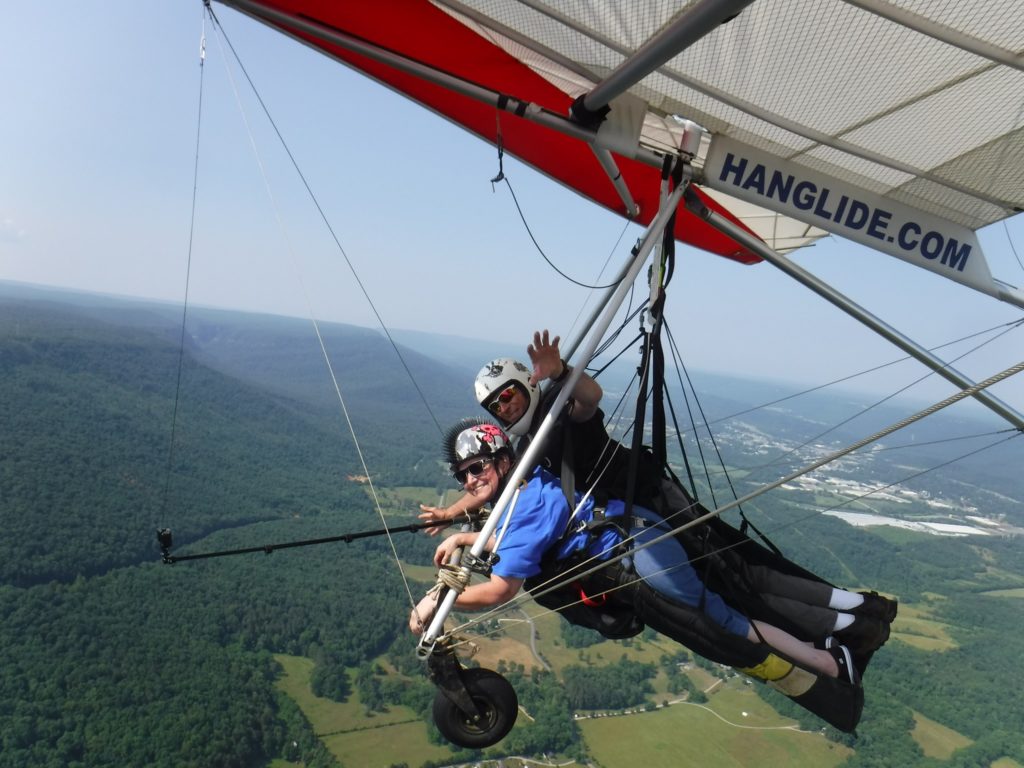
As Kim was flying over Georgia near the border of Alabama and Tennessee, she could also see as far away as North Carolina during a recent adventure at Lookout Mountain Flight Park.
“This is one of the reasons I love Shepherd Center,” Kim affirms. “They support you doing anything you want to do. They have health and wellness clinics too. It all ties in together you know, like mind, body and spirit.”
KIM STAYS CONNECTED IN HER COMMUNITY AND URGES YOU TO DO SO TOO
“I’m lucky to live near a city where so much is going on. iFly Atlanta (indoor skydiving) hosts an All Abilities Night every month. The excitement and freedom I get from that is so thrilling! The flight instructors are specially trained to work with those with disabilities and we always feel safe and secure while enjoying the rush of going From Chair to Air,” she adds.
“I love things I can do by myself. I always tell people ‘if my chair is empty, I’m out enjoying life.’
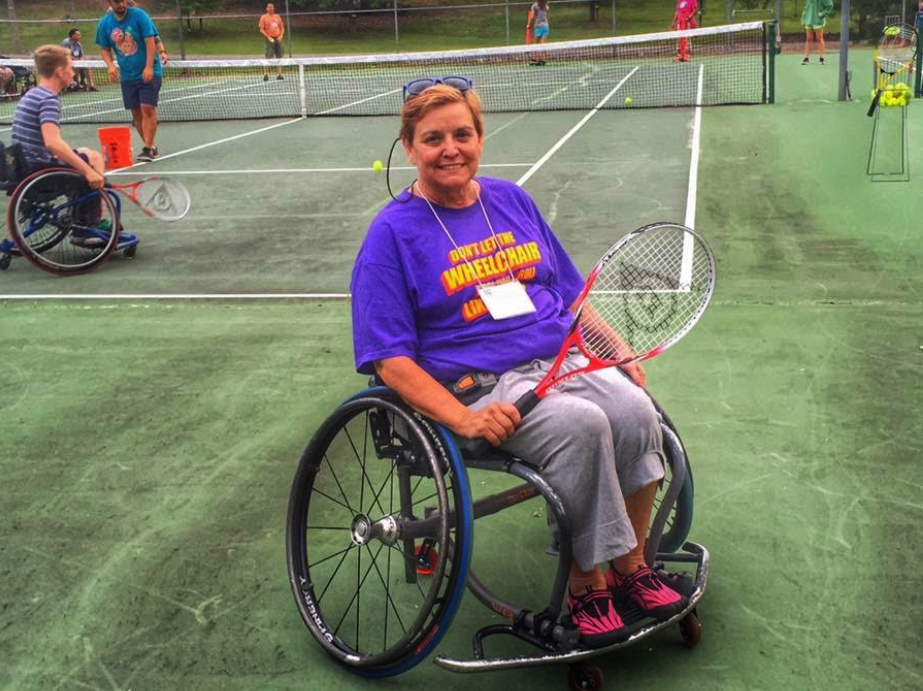 She insists, “instead of doing nothing, you gotta get out and create your opportunity sometimes. You can’t wait for it to show up on your door.”
She insists, “instead of doing nothing, you gotta get out and create your opportunity sometimes. You can’t wait for it to show up on your door.”
Kim is an activist now too. She regularly participates in the Roll On Capitol Hill movement with United Spinal which began in 2012 with three wheelchair users.
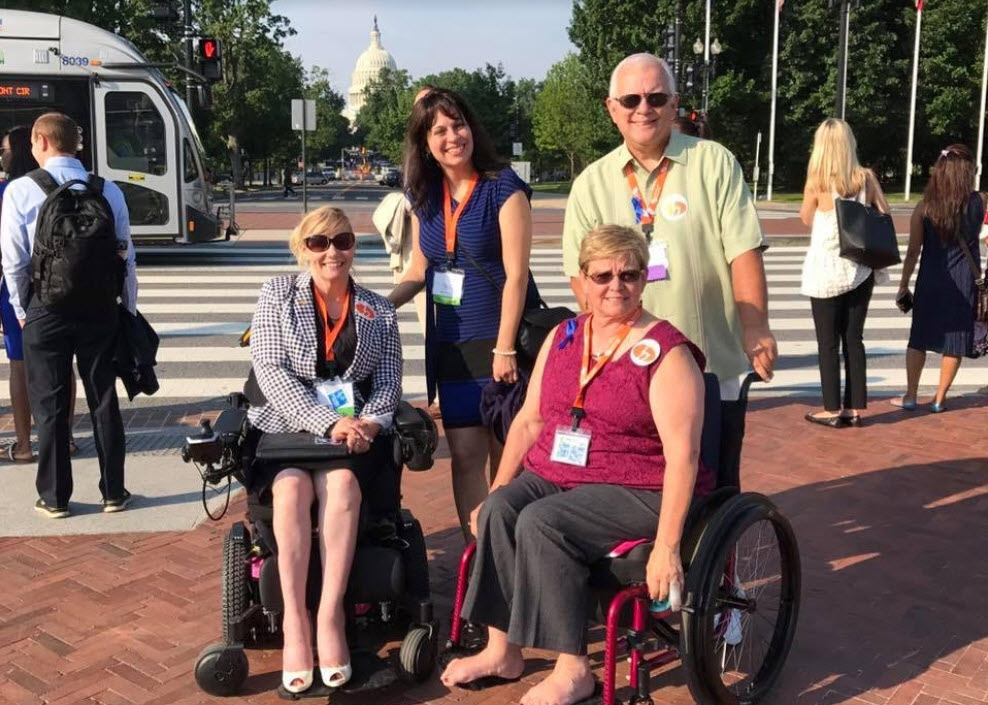
Marching alongside Kim at Roll on Capitol Hill were notable disability activist Madonna Long, Cure Medical representative Lisa Wells and Kim’s extraordinary husband Brian Harrison.
“This year, there’ll be over 100 attending,” Kim says. “We meet with our state representatives to advocate for policies that benefit the disabled community, like getting Medicare to pay for the equipment we need. Our past meetings during Roll on Capitol Hill also played a part in getting the Air Care Accessibility Act passed. A large part of my life now revolves around helping whenever I can.”
VIDEO: WHAT HAPPENS DURING ROLL ON CAPITOL HILL
KIM HARRISON CHOOSES CURE MEDICAL
“I love Cure Medical for so many reasons. One is because they donate 10% of their net income to paralysis research. I don’t know any other medical company or anyone else who does that, do you?,” Kim asks.
“Even better, they’ll send you a bunch of intermittent catheter samples to try when you’re newly injured and figuring out what works best for you,” she adds.
“I know their products are made without any scary chemicals too. I love everything about Cure catheters and their company in terms of how they serve our community!”
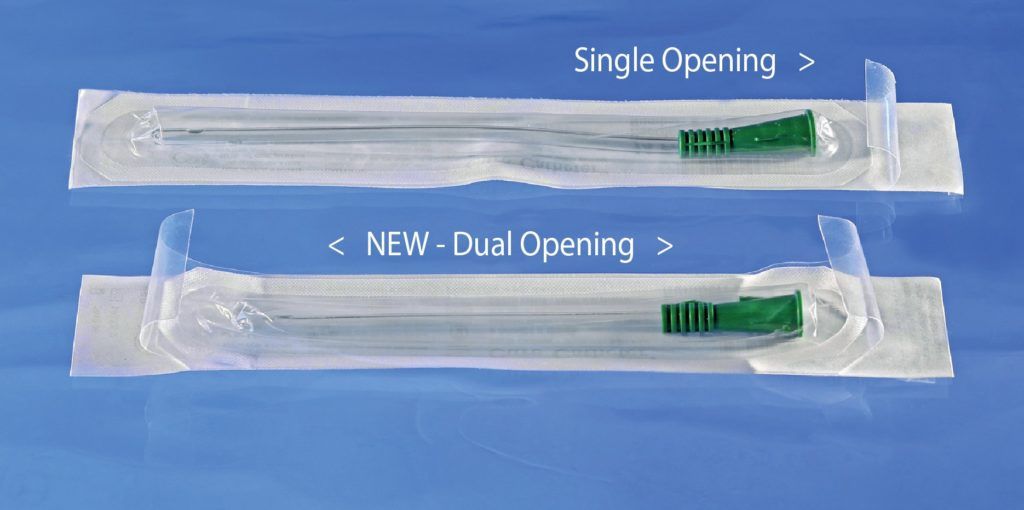
 Choose a Cure like Kim does! Request free samples of the Cure Catheter® or any Cure Medical catheter, contact your local distributor of quality healthcare products, or click here.
Choose a Cure like Kim does! Request free samples of the Cure Catheter® or any Cure Medical catheter, contact your local distributor of quality healthcare products, or click here.
Founded by a quadriplegic, Cure Medical is the only catheter manufacturer in the world that donates the first 10% of its net income to support research programs in pursuit of a cure for urinary retention, paralysis, spinal cord injury and central nervous system disorders.
Enjoy Our Free Resources & Articles
CURE NATION is designed with you in mind, to offer assistance and education when you need it through a personal support program.
View our lifestyle resources by condition type:
Multiple Sclerosis, Pelvic Organ Prolapse, Prostate Cancer, Spina Bifida, Spinal Cord Injury and Transverse Myelitis
- Sign up for our free, CURE NATION e-newsletterto have our latest stories delivered directly to you, once a month.
- Get our FREE LIFESTYLE + ACCESSIBLE TRAVEL BOOKS here.
- Meet us in person at a CURE NATION event.
- Have an idea you’d like to share? Let us know.
- Be sure to take minute to meet our Cure Advocates too.
You may also enjoy:
Gridiron Heroes Help SCI Families After High School Football Injuries
Revealing Abilities That Make People Extraordinary
Understanding DEHP and Your Health
United Spinal Offers New Beginning SCI Backpacks
Preparing for a Hurricane When You Use a Wheelchair
Chris Collin is Free to Be Wild
Wheels2Walking Takes SCI Experiences from the Street to Your Screen
Fit For a Cause: Wheelchair Bodybuilding with Reggie Bennett

